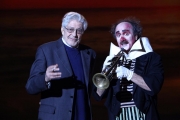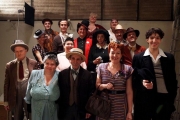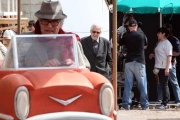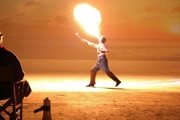• Carte blanche à Jacques Perrin •
Synopsis
The film is a tribute to and a portrait of Federico Fellini, told by Ettore Scola on the twentieth anniversary of the great director’s death. Other than Fellini’s incredibly rich cinema – a shared treasure for a worldwide audience – what this devoted admirer of the incomparable maestro wants to commemorate, is a few private and lesser-known aspects of Fellini’s personality. He wants to evoke the privilege of knowing the great director and the emotions he provoked in all who listened to him with his irony and his thoughts on “life as a party”.
The film recreates their encounter in the newsroom of the satirical paper Marc’Aurelio, their friendships with screenwriters Ruggero Maccari, Flaiano (who co-wrote ten screenplays with Fellini, including La Strada and La Dolce Vita), with actors Alberto Sordi and Marcello Mastroianni, the sets of the mythical Theatre 5 of Cinecittà Studios, and other shared experiences that cemented their enduring friendship.
From his debut as a young designer in 1939 to his fifth Oscar in 1993, year of his seventy-third and last birthday, Federico is depicted as a great Pinocchio that fortunately never turned into a “proper boy”.
Ettore, Paola and Silvia Scola
July 2013
Credits
Director: Ettore Scola
Cinematographer: Luciano Tovoli
Screenplay: Ettore, Paola and Silvia Scola
Producer: PayperMoon Italia Srl, Palomar, Istituto Luce-Cinecittà
Cast
Tommaso Lazotti • Vittorio Viviani
Sergio Pierattini
Schedule & Presentation
![]() Presentation by and discussion with italian cinematographer Luciano Tovoli
Presentation by and discussion with italian cinematographer Luciano Tovoli
More information
Born in Trevico in the late 40s, Ettore Scola joins the group of comedians collaborating on the satirical magazine Marc’Aurelio which allows him to begin his apprenticeship, a few years later, as a writer with Metz and Marchesi. In 1964, after more than seventy screenplays written for other directors, he makes his directorial debut with Let’s Talk About Women, written with Ruggero Maccari. In 1970 he directs The Pizza Triangle for which Mastroianni wins the Palme d’Or for Best Actor. However, it is only with the 1974 generational portrait We All Loved Each Other So Much that he is recognized as one of the leading authors of Italian cinema. In 1976, Down and Dirty wins the award for Best Director at the Cannes Film Competition. The following year, A Special Day earns him a David di Donatello for Best Director as well as an Oscar nomination for Best Foreign Film.
In the 80s, he abandons comedy to devote himself to period films like Le Bal (1984), which garners both a David di Donatello and a Silver Bear for Best Director. He then directs The Family (1987), winner of three David di Donatello, two Nastro d’Argento and an Oscar nomination, followed by What time is it? (1989) for which the protagonists, Mastroianni and Troisi, are honored with Best Actor awards at the Venice International Film Festival.
In 1995 Scola returns to comedy with Romanzo di un giovane povero. After Unfair Competition (2001) and Gente di Roma (2003), he directs the documentary Sergio Amidei – Portrait of a writer of cinema (1995). In 2011 he is awarded the David di Donatello for Lifetime Achievement. Che strano chiamarsi Federico – Scola racconta Fellini (2013) is his most recent film.
Luciano Tovoli, born in Massa Marittima in 1936, is an Italian cinematographer, director and screenwriter. He remains one of the most celebrated and demanded contemporary cinematographers, having done more than sixty films with most prominent Italian, American and French directors.
In the early seventies, his cinematographer career took a leap forward with international successes like The Passenger (1975) by Michelangelo Antonioni, nominated for the Palme d’Or at the Cannes International Film Festival, or the horror movie Suspiria (1976) by Dario Argento. During that decade, he also worked with German director Peter Fleischmann, and Italian directors Luigui Comencini, Marco Ferreri and Valerio Zurlini (Le Désert des Tartares, 1976). He also started his collaboration with French director Maurice Pialat, with whom he will work on three acclaimed films (Nous ne vieillirons pas ensemble, 1972; Police, 1985; Sous le soleil de Satan, 1987).
In the eighties, he pursued his association with Michelangelo Antonioni for a film adaptation of one of Jean Cocteau’s plays (II Mistero di Oberwald, 1981). He also started collaborating with French director Francis Veber, with whom he will work on five films from 1986 to 2003 (among them Le Dîner de cons, awarded three Césars in 1999), and with Georges Lautner (La Cage aux folles-3,1985). He also worked with Nanni Moretti on Bianca (1984) and started his collaboration with Italian director Ettore Scola who continues to be a presence in Tovoli’s career with five films made together so far (Splendor, 1989; What time is it?, 1989; The Voyage of Captain Fracassa, 1990; Mario, Maria, Mario, 1993; and most recently, Che strano chiamarsi Federico – Scola racconta Fellini, 2013).
The nineties are the beginning of another lasting collaboration between Tovoli and director Barbet Schroeder, first in Reversal of Fortune (1990), followed by Tivoli’s first American production Single White Female (1992) and then again in Kiss of Death (1995), Before and After (1996), Desperate Measures (1998) or Murder by numbers (2002).
Luciano Tovoli also collaborated with French director, actor and producer Jacques Perrin on several films, including Le Désert des Tartares (1976) by Valerio Zurlini, Les Quarantièmes Rugissants (1982) by Christian de Chalonge, and Perrin’s more recent documentary Océans (2007).










